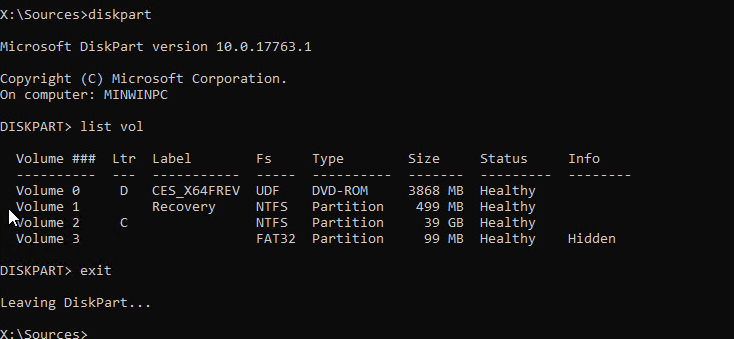Для проверки целостности системных файлов и восстановления поврежденных файлов (библиотек) компонентов в Windows (Windows Server) можно использовать команды SFC и DISM. Эти две утилиты могут быть крайне полезными, если операционная система Windows работает нестабильно, появляются ошибки при запуске стандартных приложений или служб, после вирусного заражения и т.д.
В этой статье мы рассмотрим, как использовать команды
sfc /scannow
,
DISM /Online /Cleanup-Image /RestoreHealth
или
Repair-WindowsImage -Online -RestoreHealth
для восстановления образа и системных фалов в Windows 10/11 и Windows Server 2022/2019/2016.
Содержание:
- SFC /scannow: восстановление системных файлов Windows
- Проверка целостности хранилища компонентов Windows с помощью DISM
- Восстановление образа Windows с помощью DISM /RestoreHealth
- DISM /Source: восстановление образа Windows с установочного диска
- Восстановление образа Windows с помощью PowerShell
- DISM: восстановление поврежденного хранилища компонентов, если Windows не загружается
SFC /scannow: восстановление системных файлов Windows
Перед тем, как восстанавливать образ Windows с помощью DISM, рекомендуется сначала попробовать проверить целостность системных файлов с помощью утилиты SFC (System File Checker). Команда
sfc /scannow
позволяет проверить целостность системных файлов Windows. Если какие-то системные файлы отсутствуют или повреждены, утилита SFC попробует восстановить их оригинальные копии из хранилища системных компонентов Windows (каталог C:\Windows\WinSxS).
Утилита SFC записывает все свои действия в лог-файл
windir%\logs\cbs\cbs.log
. Для всех записей, оставленных SFC в файле CBS.log проставлен тег [SR]. Чтобы выбрать из лога только записи, относящиеся к SFC, выполните команду:
findstr /c:"[SR]" %windir%\Logs\CBS\CBS.log >"%userprofile%\Desktop\sfc.txt"
Если команда sfc /scannow возвращает ошибку “
Программа защиты ресурсов Windows обнаружила повреждённые файлы, но не может восстановить некоторые из них / Windows Resource Protection found corrupt files but was unable to fix some of them
”, скорее всего утилита не смогла получить необходимые файла из хранилища компонентов (образа) Windows.
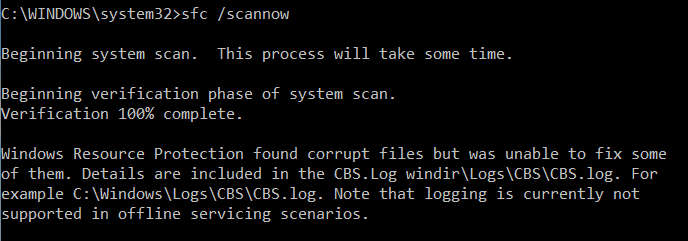
В этом случае вам нужно попробовать восстановить хранилище компонентов вашего образа Windows с помощью DISM.
После восстановления образа вы можете повторно использовать утилиту SFC для восстановления системных файлов.
Проверка целостности хранилища компонентов Windows с помощью DISM
Утилита DISM (Deployment Image Servicing and Management) доступна во всех версиях Windows, начиная с Vista.
Для сканирования образа Windows на наличие ошибок и их исправления используется параметр DISM /Cleanup-image. Команды DISM нужно запускать из командной строки, с правами администратора.
Чтобы проверить наличие признака повреждения хранилища компонентов в образе Windows (флаг CBS), выполните команду (не применимо к Windows 7/Server 2008R2):
DISM /Online /Cleanup-Image /CheckHealth
Эта команда не выполняет полное сканирование хранилища компонентов. Проверяются лишь записанные ранее маркеры повреждений и события в журнале Windows. Изменения в образ не вносятся. Команда проверит, не помечен ли ваш образ Windows как поврежденный и возможно ли исправить его.
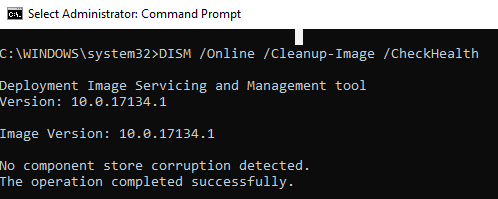
В этом примере команда вернула, что с образом все хорошо:
No component store corruption detected. The operation completed successfully.
Чтобы выполнить полное сканирование хранилища компонентов на наличие повреждений в хранилище компонентов Windows, запустите команду:
DISM /Online /Cleanup-Image /ScanHealth
Команда проверки образа Windows может выполняться довольно долго (от 10 до 30 минут). И вернет один из трех результатов:
- No component store corruption detected – DISM не обнаружил повреждения в хранилище компонентов;
- The component store is repairable – DISM обнаружил ошибки в хранилище компонентов и может исправить их;
- The component store is not repairable – DISM не может исправить хранилище компонентов Windows (попробуйте использовать более новую версию DISM или вам придется восстанавливать образ Windows из резервной копии, сбрасывать или полностью переустанавливать вашу копию Windows.

В Windows 7 и Windows Server 2008 R2 для использования параметра DISM /ScanHealth нужно установить отдельное обновление KB2966583. Иначе при запуске DISM будет появляться “
Ошибка 87. Параметр ScanHealth не распознан в этом контексте
”.
Команда DISM /ScanHealth может вернуть ошибки:
- Ошибка: 1726. Сбой при удалённом вызове процедуры;
- Ошибка: 1910. Не найден указанный источник экспорта объекта.
Это однозначно говорит о том, что ваш образ Windows поврежден и его нужно восстановить.
Восстановление образа Windows с помощью DISM /RestoreHealth
Чтобы исправить повреждения в хранилище компонентов образа Windows нужно использовать опцию RestoreHealth команды DISM. Эта опция позволит исправить найденные в образе ошибки, автоматически скачать и заменить файлы повреждённых или отсутствующих компонентов эталонными версиями файлов из центра обновлений Windows (на компьютере должен быть доступ в Интернет). Выполните команду:
DISM /Online /Cleanup-Image /RestoreHealth
В Windows 7/2008 R2 эта команда выглядит по другому:
DISM.exe /Online /Cleanup-Image /ScanHealth
Процесс сканирования и восстановления компонентов может быть довольно длительным (30 минут или более). DISM автоматически загрузит недостающие или поврежденные файлы образа с серверов Windows Update.
Восстановление выполнено успешно. Операция успешно завершена.
The restore operation completed successfully.

DISM /Source: восстановление образа Windows с установочного диска
Если на компьютере (сервере) отсутствует доступ в Интернет или отключена/повреждена служба Windows Update (как восстановить клиент Windows Update), то при восстановлении хранилища компонентов появятся ошибки:
- 0x800f0906 — Не удалось скачать исходные файлы. Укажите расположение файлов, необходимых для восстановления компонента, с помощью параметра Источник (0x800f0906 — The source files could not be downloaded. Use the source option to specify the location of the files that are required to restore the feature);
- Ошибка: 0x800f0950 — Сбой DISM. Операция не выполнена (0x800f0950 — DISM failed. No operation was performed);
- Ошибка:0x800F081F. Не удалось найти исходные файлы. Укажите расположение файлов, необходимых для восстановления компонента, с помощью параметра Источник (Error 0x800f081f, The source files could not be found. Use the «Source» option to specify the location of the files that are required to restore the feature).

<
Во всех этих случаях вы можете использовать альтернативные средства получения оригинальных файлов хранилища компонентов. Это может быть:
- Установочный диск/флешка/iso образ Windows
- Смонтированный файл wim
- Папка \sources\SxS с установочного диска
- Файл install.wim с установочным образом Windows
Вы можете указать WIM или ESD файл с оригинальным установочным образом Windows, который нужно использовать в качестве источника для восстановления файлов системы. Предположим, вы смонтировали установочный ISO образ Windows 11 в виртуальный привод D:.
Примечание. Для восстановления поврежденных файлов в хранилище компонентов из локального источника версия и редакция Windows в образе должна полностью совпадать с вашей.
С помощью следующей PowerShell команды проверьте, какая версия Windows установлена на вашем компьютере:
Get-ComputerInfo |select WindowsProductName,WindowsEditionId,WindowsVersion, OSDisplayVersion

Выведите список доступных версий Windows в установочном образе:
Get-WindowsImage -ImagePath "D:\sources\install.wim"
В нашем случае образ Windows 11 Pro в образе install.wim имеет
ImageIndex = 6
.
Для восстановления хранилища компонентов из локального WIM/ESD файла с блокированием доступа в интернет, выполните следующую команду (не забудьте указать ваш индекс версии Windows в файле):
DISM /online /cleanup-image /restorehealth /source:WIM:D:\sources\install.wim:6 /limitaccess
Или:
DISM /online /cleanup-image /restorehealth /source:ESD:D:\sources\install.esd:6 /limitaccess

Если при запуске появляется
- Ошибка Error: 50: DISM does not support servicing Windows PE with the /Online option, значит ваша DISM считает, что вы используете WinPE образWindows. Чтобы исправить это, удалите ветку реестра HKEY_LOCAL_MACHINE\SYSTEM\CurrentControlSet\Control\MiniNT.
Ошибка DISM Error 87: проверьте правильно написания команды, убедитесь что вы используете версию DISM для вашей версии Windows (обычно бывает при загрузке через WinPE/WinRE).
Утилита DISM пишет подробный журнал сканирования и восстановления системных файлов в файл
C:\Windows\Logs\DISM\dism.log
.
После восстановления хранилища компонентов вы можете запустить утилиту проверки системных файлов
sfc /scannow
. Скорее всего она успешно восстановит поврежденные файлы:
Программа защиты ресурсов Windows обнаружила поврежденные файлы и успешно их восстановила.
Windows Resource Protection found corrupt files and successfully repaired them.

Если все системные файлы целы, появится сообщение:
Windows Resource Protection did not find any integrity violations
Восстановление образа Windows с помощью PowerShell
В версии PowerShell в Windows 10/11 и Windows Server 2022/2019 есть аналоги рассмотренных выше команд DISM. Для сканирования хранилища компонентов и поиска повреждений в образе выполните:
Repair-WindowsImage -Online –ScanHealth

Если ошибок в хранилище компонентов не обнаружено, появится сообщение:
ImageHealth State: Healthy
Для запуска восстановления системных компонентов и файлов наберите:
Repair-WindowsImage -Online -RestoreHealth
При отсутствии доступа к интернету эта команда может зависнуть в процессе восстановления образа. Вы можете восстановить системные компоненты из локальной копии образа Windows в виде WIM/ESD файла, скопированного с установочного ISO образа Windows 10 (здесь также нужно указать индекс версии Windows в wim файле в качестве источника восстановления):
Repair-WindowsImage -Online -RestoreHealth -Source D:\sources\install.wim:5 –LimitAccess
DISM: восстановление поврежденного хранилища компонентов, если Windows не загружается
Если Windows не загружается корректно, вы можете выполнить проверку и исправление системных файлов в оффлайн режиме.
- Для этого загрузите компьютер с установочного образа Windows (проще всего создать загрузочную USB флешку с Windows 10/11 с помощью Media Creation Tool) и на экране начала установки нажмите
Shift + F10 - Чтобы разобраться с буквами дисков, назначенных в среде WinPE, выполните команду
diskpart
->
list vol
(в моем примере диску, на котором установлена Windows присвоена буква C:\, эту букву я буду использовать в следующих командах); - Проверим системные файлы и исправим поврежденные файлы командой:
sfc /scannow /offbootdir=C:\ /offwindir=C:\Windows
- Для исправления хранилища компонентов используйте следующую команду (в качестве источника для восстановления компонентов мы используем WIM файл с установочным образом Windows 10, с которого мы загрузили компьютер):
Dism /image:C:\ /Cleanup-Image /RestoreHealth /Source:WIM:D:\sources\install.wim:6 - Если на целевом диске недостаточно места, то для извлечения временных файлов нам понадобится отдельный диск достаточного размера, например F:\, на котором нужно создать пустой каталог:
mkdir f:\scratch
и запустить восстановление хранилища компонентов командой:
Dism /image:C:\ /Cleanup-Image /RestoreHealth /Source:D:\sources\install.wim /ScratchDir:F:\scratch
Совет. Другие полезные команды DISM, которые должен знать администратор:
-
DISM /Add-Package
– установка MSU/CAB файлов обновлений, интеграция обновлений в образ Windows; -
DISM /Get-Drivers
– получение списка установленных драйверов; -
DISM /Add-Driver
– добавление драйверов в образ; -
DISM /Export-Driver
– экспорт установленных драйверов Windows; -
DISM /Add-Capability
– установка дополнительных компонентов Windows через Features on Demand (например, RSAT, сервер OpenSSH или ssh клиент Windows; -
DISM /Enable-Features
и
/Disable-Features
– включение и отключение компонентов Windows (например, протокола SMBv1), -
DISM /online /Cleanup-Image /StartComponentCleanup
– очистка хранилища компонентов и удаление старых версий компонентов (папки WinSxS); -
DISM /set-edition
– конвертирование ознакомительной редакции Windows на полную без переустановки.

-
Microsoft Support & Malware Removal
-
Windows Update
You should upgrade or use an alternative browser.
Windows Server 2012R2 — sfc /scannow unable to fix some of them
-
Thread starter
Thread starterfoxco
-
Start date
Start date
- Joined
- Apr 13, 2018
- Posts
- 34
-
-
#1
I’m unable to install latest Windows Update on my server. (VM running on VMware)
I search and finaly launch SFC /scannow which was not able to fix issues.
I try to run Dism /Online /Cleanup-Image /RestoreHealth and get errror related to sources.
I connect the ISO used to install the VM and launch the process using sources parameters but get always an error related to sources.
Finaly, I find your tool SFCFIX.
I run it, add the same ISO as source,
and get error message related to sources, I try again without the ISO, same behavour…
but good point is I’m now able to know which files are corrupted.
SFCFix version 3.0.0.0 by niemiro.
Start time: 2018-04-13 09:40:37.776
Microsoft Windows Server 2012 R2 Update 3 - amd64
Not using a script file.
AutoAnalysis::
CORRUPT: C:\Windows\winsxs\amd64_microsoft-windows-d..rvices-domain-files_31bf3856ad364e35_6.3.9600.18476_none_8bd6131b174d5ba6\ntds.dit
CORRUPT: C:\Windows\winsxs\amd64_microsoft-windows-d..services-core-files_31bf3856ad364e35_6.3.9600.18476_none_80b6378ffae9759b\Active Directory Diagnostics.xml
CORRUPT: C:\Windows\winsxs\amd64_microsoft-windows-ie-ratings_31bf3856ad364e35_11.0.9600.18639_none_cb31c10f3fcd1e47\icrav03.rat
CORRUPT: C:\Windows\winsxs\x86_microsoft-windows-ie-ratings_31bf3856ad364e35_11.0.9600.18639_none_6f13258b876fad11\icrav03.rat
SUMMARY: Some corruptions could not be fixed automatically. Seek advice from helper or sysnative.com.
CBS & SFC total detected corruption count: 4
CBS & SFC total unimportant corruption count: 0
CBS & SFC total fixed corruption count: 0
SURT total detected corruption count: 0
SURT total unimportant corruption count: 0
SURT total fixed corruption count: 0
AutoAnalysis:: directive completed successfully.
Successfully processed all directives.
SFCFix version 3.0.0.0 by niemiro has completed.
Currently storing 0 datablocks.
Finish time: 2018-04-13 11:16:22.246
----------------------EOF-----------------------The CBS folder (Zip 24Mb) is available online : http://foxdemo.be/customers/CBS.rar
Any help to sort this out is welcome.
Thanks
- Joined
- Apr 13, 2018
- Posts
- 34
- Joined
- Apr 13, 2018
- Posts
- 34
-
-
#3
SFC /Scannow is still not running fine due to some hashes errors
Key words
hashes for file member systemroot winsxs
- Joined
- Apr 13, 2018
- Posts
- 34
-
-
#4
AutoAnalysis::
CORRUPT: C:\Windows\winsxs\amd64_microsoft-windows-d..rvices-domain-files_31bf3856ad364e35_6.3.9600.18476_none_8bd6131b174d5ba6\ntds.dit
CORRUPT: C:\Windows\winsxs\amd64_microsoft-windows-d..services-core-files_31bf3856ad364e35_6.3.9600.18476_none_80b6378ffae9759b\Active Directory Diagnostics.xml
CORRUPT: C:\Windows\winsxs\amd64_microsoft-windows-ie-ratings_31bf3856ad364e35_11.0.9600.18639_none_cb31c10f3fcd1e47\icrav03.rat
CORRUPT: C:\Windows\winsxs\x86_microsoft-windows-ie-ratings_31bf3856ad364e35_11.0.9600.18639_none_6f13258b876fad11\icrav03.rat
- Joined
- Oct 9, 2014
- Posts
- 741
-
-
#5
Retrieve Components Hive
1. Navigate to C:\Windows\System32\Config and locate the COMPONENTS file.
2. Please copy this file to your desktop.
Note: If you receive an error that this file is in-use, simply reboot your computer and try again.
3. Right-click on this file on your desktop and select Send To…Compressed (zipped) folder. This will create a file named COMPONENTS.ZIP on your desktop.
4. The file will likely be too large to upload here so please upload toa file sharing service and just provide the link here.
- Joined
- Apr 13, 2018
- Posts
- 34
- Joined
- Oct 9, 2014
- Posts
- 741
-
-
#7
Warning: this fix is specific to the user in this thread. No one else should follow these instructions as it may cause more harm than good. If you are after assistance, please start a thread of your own.
- Download SFCFix.exe (by niemiro) and save this to your Desktop.
- Download the file below, SFCFix.zip, and save this to your Desktop. Ensure that this file is named SFCFix.zip — do not rename it.
- Save any open documents and close all open windows.
- On your Desktop, you should see two files: SFCFix.exe and SFCFix.zip.
- Drag the file SFCFix.zip onto the file SFCFix.exe and release it.
- SFCFix will now process the script.
- Upon completion, a file should be created on your Desktop: SFCFix.txt.
- Copy (Ctrl+C) and Paste (Ctrl+V) the contents of this file into your next post for me to analyse please — put [CODE][/CODE] tags around the log to break up the text.
SFC Scan
- Click on the Start button and in the search box, type Command Prompt
- When you see Command Prompt on the list, right-click on it and select Run as administrator
- When command prompt opens, copy and paste the following commands into it, press enter after each
sfc /scannow
Wait for this to finish before you continue
copy %windir%\logs\cbs\cbs.log %userprofile%\Desktop\cbs.txt
- This will create a file, cbs.txt on your Desktop. Please attach this to your next post.
Attachments
-
SFCFix.zip
- Joined
- Apr 13, 2018
- Posts
- 34
-
-
#8
SFCFix :
SFCFix version 3.0.0.0 by niemiro.
Start time: 2018-04-29 10:16:16.550
Microsoft Windows Server 2012 R2 Update 3 - amd64
Using .zip script file at C:\Users\Administrateur\Desktop\SFCFix.zip [0]
PowerCopy::
Successfully took permissions for file or folder C:\Windows\winsxs\x86_microsoft-windows-ie-ratings_31bf3856ad364e35_11.0.9600.18639_none_6f13258b876fad11\icrav03.rat
Successfully took permissions for file or folder C:\Windows\winsxs\amd64_microsoft-windows-ie-ratings_31bf3856ad364e35_11.0.9600.18639_none_cb31c10f3fcd1e47\icrav03.rat
Successfully took permissions for file or folder C:\Windows\winsxs\amd64_microsoft-windows-d..services-core-files_31bf3856ad364e35_6.3.9600.18476_none_80b6378ffae9759b\Active Directory Diagnostics.xml
Successfully took permissions for file or folder C:\Windows\winsxs\amd64_microsoft-windows-d..rvices-domain-files_31bf3856ad364e35_6.3.9600.18476_none_8bd6131b174d5ba6\ntds.dit
Successfully copied file C:\Users\Administrateur\AppData\Local\niemiro\Archive\winsxs\x86_microsoft-windows-ie-ratings_31bf3856ad364e35_11.0.9600.18639_none_6f13258b876fad11\icrav03.rat to C:\Windows\winsxs\x86_microsoft-windows-ie-ratings_31bf3856ad364e35_11.0.9600.18639_none_6f13258b876fad11\icrav03.rat.
Successfully copied file C:\Users\Administrateur\AppData\Local\niemiro\Archive\winsxs\amd64_microsoft-windows-ie-ratings_31bf3856ad364e35_11.0.9600.18639_none_cb31c10f3fcd1e47\icrav03.rat to C:\Windows\winsxs\amd64_microsoft-windows-ie-ratings_31bf3856ad364e35_11.0.9600.18639_none_cb31c10f3fcd1e47\icrav03.rat.
Successfully copied file C:\Users\Administrateur\AppData\Local\niemiro\Archive\winsxs\amd64_microsoft-windows-d..services-core-files_31bf3856ad364e35_6.3.9600.18476_none_80b6378ffae9759b\Active Directory Diagnostics.xml to C:\Windows\winsxs\amd64_microsoft-windows-d..services-core-files_31bf3856ad364e35_6.3.9600.18476_none_80b6378ffae9759b\Active Directory Diagnostics.xml.
Successfully copied file C:\Users\Administrateur\AppData\Local\niemiro\Archive\winsxs\amd64_microsoft-windows-d..rvices-domain-files_31bf3856ad364e35_6.3.9600.18476_none_8bd6131b174d5ba6\ntds.dit to C:\Windows\winsxs\amd64_microsoft-windows-d..rvices-domain-files_31bf3856ad364e35_6.3.9600.18476_none_8bd6131b174d5ba6\ntds.dit.
Successfully restored ownership for C:\Windows\winsxs\x86_microsoft-windows-ie-ratings_31bf3856ad364e35_11.0.9600.18639_none_6f13258b876fad11\icrav03.rat
Successfully restored permissions on C:\Windows\winsxs\x86_microsoft-windows-ie-ratings_31bf3856ad364e35_11.0.9600.18639_none_6f13258b876fad11\icrav03.rat
Successfully restored ownership for C:\Windows\winsxs\amd64_microsoft-windows-ie-ratings_31bf3856ad364e35_11.0.9600.18639_none_cb31c10f3fcd1e47\icrav03.rat
Successfully restored permissions on C:\Windows\winsxs\amd64_microsoft-windows-ie-ratings_31bf3856ad364e35_11.0.9600.18639_none_cb31c10f3fcd1e47\icrav03.rat
Successfully restored ownership for C:\Windows\winsxs\amd64_microsoft-windows-d..services-core-files_31bf3856ad364e35_6.3.9600.18476_none_80b6378ffae9759b\Active Directory Diagnostics.xml
Successfully restored permissions on C:\Windows\winsxs\amd64_microsoft-windows-d..services-core-files_31bf3856ad364e35_6.3.9600.18476_none_80b6378ffae9759b\Active Directory Diagnostics.xml
Successfully restored ownership for C:\Windows\winsxs\amd64_microsoft-windows-d..rvices-domain-files_31bf3856ad364e35_6.3.9600.18476_none_8bd6131b174d5ba6\ntds.dit
Successfully restored permissions on C:\Windows\winsxs\amd64_microsoft-windows-d..rvices-domain-files_31bf3856ad364e35_6.3.9600.18476_none_8bd6131b174d5ba6\ntds.dit
PowerCopy:: directive completed successfully.
Successfully processed all directives.
SFCFix version 3.0.0.0 by niemiro has completed.
Currently storing 4 datablocks.
Finish time: 2018-04-29 10:16:17.503
Script hash: uIhtWAvwrDr4mF/S0iVJ19mjojUjCJv33wh5IwcdHIQ=
----------------------EOF-----------------------SFC /Scannow -> cbs.log View attachment cbs.txt
- Joined
- Oct 9, 2014
- Posts
- 741
-
-
#9
Warning: this fix is specific to the user in this thread. No one else should follow these instructions as it may cause more harm than good. If you are after assistance, please start a thread of your own.
- Download SFCFix.exe (by niemiro) and save this to your Desktop.
- Download the file below, SFCFix.zip, and save this to your Desktop. Ensure that this file is named SFCFix.zip — do not rename it.
- Save any open documents and close all open windows.
- On your Desktop, you should see two files: SFCFix.exe and SFCFix.zip.
- Drag the file SFCFix.zip onto the file SFCFix.exe and release it.
- SFCFix will now process the script.
- Upon completion, a file should be created on your Desktop: SFCFix.txt.
- Copy (Ctrl+C) and Paste (Ctrl+V) the contents of this file into your next post for me to analyse please — put [CODE][/CODE] tags around the log to break up the text.
SFC Scan
- Click on the Start button and in the search box, type Command Prompt
- When you see Command Prompt on the list, right-click on it and select Run as administrator
- When command prompt opens, copy and paste the following commands into it, press enter after each
sfc /scannow
Wait for this to finish before you continue
copy %windir%\logs\cbs\cbs.log %userprofile%\Desktop\cbs.txt
- This will create a file, cbs.txt on your Desktop. Please attach this to your next post.
Attachments
-
SFCFix.zip
- Joined
- Apr 13, 2018
- Posts
- 34
-
-
#10
SFCFix version 3.0.0.0 by niemiro.Start time: 2018-04-29 17:57:20.165
Microsoft Windows Server 2012 R2 Update 3 - amd64
Using .zip script file at C:\Users\Administrateur\Desktop\SFCFix.zip [1]
PowerCopy::
Successfully took permissions for file or folder C:\Windows\winsxs\amd64_microsoft-windows-d..services-core-files_31bf3856ad364e35_6.3.9600.18476_none_80b6378ffae9759b\active directory diagnostics.xml
Successfully took permissions for file or folder C:\Windows\winsxs\amd64_microsoft-windows-d..rvices-domain-files_31bf3856ad364e35_6.3.9600.18476_none_8bd6131b174d5ba6\ntds.dit
WARNING: File C:\Windows\winsxs\amd64_microsoft-windows-d..services-core-files_31bf3856ad364e35_6.3.9600.18476_none_80b6378ffae9759b\active directory diagnostics.xml was not backed up as that would replace the current backup.
Successfully copied file C:\Users\Administrateur\AppData\Local\niemiro\Archive\winsxs\amd64_microsoft-windows-d..services-core-files_31bf3856ad364e35_6.3.9600.18476_none_80b6378ffae9759b\active directory diagnostics.xml to C:\Windows\winsxs\amd64_microsoft-windows-d..services-core-files_31bf3856ad364e35_6.3.9600.18476_none_80b6378ffae9759b\active directory diagnostics.xml.
WARNING: File C:\Windows\winsxs\amd64_microsoft-windows-d..rvices-domain-files_31bf3856ad364e35_6.3.9600.18476_none_8bd6131b174d5ba6\ntds.dit was not backed up as that would replace the current backup.
Successfully copied file C:\Users\Administrateur\AppData\Local\niemiro\Archive\winsxs\amd64_microsoft-windows-d..rvices-domain-files_31bf3856ad364e35_6.3.9600.18476_none_8bd6131b174d5ba6\ntds.dit to C:\Windows\winsxs\amd64_microsoft-windows-d..rvices-domain-files_31bf3856ad364e35_6.3.9600.18476_none_8bd6131b174d5ba6\ntds.dit.
Successfully restored ownership for C:\Windows\winsxs\amd64_microsoft-windows-d..services-core-files_31bf3856ad364e35_6.3.9600.18476_none_80b6378ffae9759b\active directory diagnostics.xml
Successfully restored permissions on C:\Windows\winsxs\amd64_microsoft-windows-d..services-core-files_31bf3856ad364e35_6.3.9600.18476_none_80b6378ffae9759b\active directory diagnostics.xml
Successfully restored ownership for C:\Windows\winsxs\amd64_microsoft-windows-d..rvices-domain-files_31bf3856ad364e35_6.3.9600.18476_none_8bd6131b174d5ba6\ntds.dit
Successfully restored permissions on C:\Windows\winsxs\amd64_microsoft-windows-d..rvices-domain-files_31bf3856ad364e35_6.3.9600.18476_none_8bd6131b174d5ba6\ntds.dit
PowerCopy:: directive completed successfully.
Successfully processed all directives.
SFCFix version 3.0.0.0 by niemiro has completed.
Currently storing 5 datablocks.
Finish time: 2018-04-29 17:57:20.806
Script hash: R6BA6fxCS/wlvbLTEBEgOMj3+TsFyas6nC9M8Gpfh6E=
----------------------EOF-----------------------View attachment cbs.txt
- Joined
- Oct 9, 2014
- Posts
- 741
-
-
#11
- Joined
- Apr 13, 2018
- Posts
- 34
-
-
#12
I’ll restart server and try pending update (KB4093114 — KB4088785 — KB4033369 — KB4093121)
- Joined
- Oct 9, 2014
- Posts
- 741
-
-
#13
- Joined
- Apr 13, 2018
- Posts
- 34
- Joined
- Oct 9, 2014
- Posts
- 741
-
-
#15
1. Click on the Start button and in the search box, type Command Prompt
2. When you see Command Prompt on the list, right-click on it and select Run as administrator
3. When command prompt opens, copy and paste the following command into it, press enter
wusa /uninstall /KB:4015550
4. Let me know if it says it was successful or if there are any errors.
- Joined
- Apr 13, 2018
- Posts
- 34
-
-
#16
I run
[COLOR=#0000ff]wusa /uninstall /KB:[/COLOR][COLOR=#0000ff]4015550[/COLOR]in a command prompt (run as admin).
progress bar to the end and no error message.
the KB is not present (anymore ?) when searching for installed Updates.
I try then one related to flash player and it fail again.
CBS below
View attachment cbs.txt
- Joined
- Apr 13, 2018
- Posts
- 34
-
-
#17
Thanks
- Joined
- Oct 9, 2014
- Posts
- 741
-
-
#18
- Joined
- Apr 13, 2018
- Posts
- 34
-
-
#19
- Joined
- Oct 9, 2014
- Posts
- 741
-
-
#20
Warning:this fix is specific to the user in this thread. No one else should follow these instructions as it may cause more harm than good. If you are after assistance, please start a thread of your own.
- Right-click on the Start button and select Command Prompt (Admin)
- When command prompt opens, Copy (Ctrl+C) and Paste (Right-click > Paste) the following command into it, then press Enter
Dism /Online /Cleanup-Image /RestoreHealth - Once it finishes, copy and paste the following into the command-prompt window and press Enter. If prompted to overwrite the existing file go ahead.
copy %windir%\logs\cbs\cbs.log «%userprofile%\Desktop\cbs.txt»
- Once this has completed please go to your Desktop and you will find CBS.txt => Please zip/upload to this thread.
Please Note:: if the file is too big (over 7MB) to upload to your next post, please upload via a service and just provide the link.
Has Sysnative Forums helped you? Please consider donating to help us support the site!
-
Microsoft Support & Malware Removal
-
Windows Update
Administrators can diagnose and treat a buggy server operating system by using the Windows SFC and DISM utilities for image analysis and repairs.
Over time, system files in a Windows Server installation might require a fix. You can often repair the operating system without taking the server down by using Windows SFC or the more robust and powerful Deployment Image Servicing and Management commands.
Windows System File Checker (SFC) and Deployment Image Servicing and Management (DISM) are administrative utilities that can alter system files, so they must be run in an administrator command prompt window.
Start with Windows SFC
The Windows SFC utility scans and verifies version information, file signatures and checksums for all protected system files on Windows desktop and server systems. If the command discovers missing protected files or alterations to existing ones, Windows SFC will attempt to replace the altered files with a pristine version from the %systemroot%\system32\dllcache folder.
The system logs all activities of the Windows SFC command to the %Windir%\CBS\CBS.log file. If the tool reports any nonrepairable errors, then you’ll want to investigate further. Search for the word corrupt to find most problems.
Windows SFC command syntax
Open a command prompt with administrator rights and run the following command to start the file checking process:
C:\Windows\System32>sfc /scannow
The /scannow parameter instructs the command to run immediately. It can take some time to complete — up to 15 minutes on servers with large data drives is not unusual — and usually consumes 60%-80% of a single CPU for the duration of its execution. On servers with more than four cores, it will have a slight impact on performance.
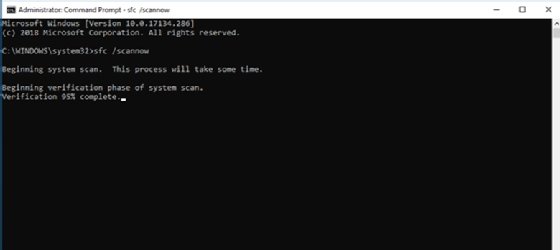
There are times Windows SFC cannot replace altered files. This does not always indicate trouble. For example, recent Windows builds have included graphics driver data that was reported as corrupt, but the problem is with Windows file data, not the files themselves, so no repairs are needed.
If Windows SFC can’t fix it, try DISM
The DISM command is more powerful and capable than Windows SFC. It also checks a different file repository — the %windir%\WinSXS folder, aka the «component store» — and is able to obtain replacement files from a variety of potential sources. Better yet, the command offers a quick way to check an image before attempting to diagnose or repair problems with that image.
Run DISM with the following parameters:
C:\Windows\System32>dism /Online /Cleanup-Image /CheckHealth
Even on a server with a huge system volume, this command usually completes in less than 30 seconds and does not tax system resources. Unless it finds some kind of issue, the command reports back «No component store corruption detected.» If the command finds a problem, this version of DISM reports only that corruption was detected, but no supporting details.
Corruption detected? Try ScanHealth next
If DISM finds a problem, then run the following command:
C:\Windows\System32>dism /Online /Cleanup-Image /ScanHealth
This more elaborate version of the DISM image check will report on component store corruption and indicate if repairs can be made.
If corruption is found and it can be repaired, it’s time to fire up the /RestoreHealth directive, which can also work from the /online image, or from a different targeted /source.
Run the following commands using the /RestoreHealth parameter to replace corrupt component store entries:
C:\Windows\System32>dism /Online /Cleanup-Image /RestoreHealth
C:\Windows\System32>dism /source:<spec> /Cleanup-Image /RestoreHealth
You can drive file replacement from the running online image easily with the same syntax as the preceding commands. But it often happens that local copies aren’t available or are no more correct than the contents of the local component store itself. In that case, use the /source directive to point to a Windows image file — a .wim file or an .esd file — or a known, good, working WinSXS folder from an identically configured machine — or a known good backup of the same machine to try alternative replacements.
By default, the DISM command will also try downloading components from the Microsoft download pages; this can be turned off with the /LimitAccess parameter. For details on the /source directive syntax, the TechNet article «Repair a Windows Image» is invaluable.
DISM is a very capable tool well beyond this basic image repair maneuver. I’ve compared it to a Swiss army knife for maintaining Windows images. Windows system admins will find DISM to be complex and sometimes challenging but well worth exploring.
Next Steps
Rebuild missing SYSVOL in Active Directory
Networking enhancements coming in Windows Server 2016
Manage a library of images for Windows deployment
Dig Deeper on Microsoft messaging and collaboration
-
10 troubleshooting steps for when Windows Update is frozen
By: Robert Sheldon
-
7 steps to fix a black screen in Windows 11
By: Robert Sheldon
-
How to create a custom Windows 11 ISO file
By: Ed Tittel
-
Windows Imaging Format (WIM)
By: Rahul Awati
Provide feedback
Saved searches
Use saved searches to filter your results more quickly
Sign up
,
One of the most useful tools that Windows contain is the System File Checker (SFC) tool, that gives you the ability to check and repair file system files. To run the SFC tool from Windows, you have to open an elevated command and then to type this command: sfc /scannow

The SFC command can run from Windows environment in Normal or in Safe Mode, but some times there is the need to run the SFC command offline, if Windows cannot boot normally or in safe mode. In this case(s), you can boot your system from a Windows Installation Media (DVD or USB) and run the SCF command offline.
In this tutorial you ‘ll learn how to scan and repair system files by using the System File Checker (SFC) tool, if Windows cannot start. (Windows 10 & Windows 8).
How to run the SFC /SCANNOW command if your system cannot boot to Windows (Offline).
Requirements: In order to run the sfc/scannow in a non bootable Windows system, you need to boot your system from a Windows Installation Media (USB or DVD), according to your Windows OS Version and Edition (e.g. 64 or 32 bit). If you don’t have a Windows installation media, then you can create one directly from Microsoft.
- How to create a Windows 10 USB boot media.
- How to create a Windows 10 DVD boot media.
1. Boot your computer from the Windows Installation Media.
2. At Language options screen, click Next.
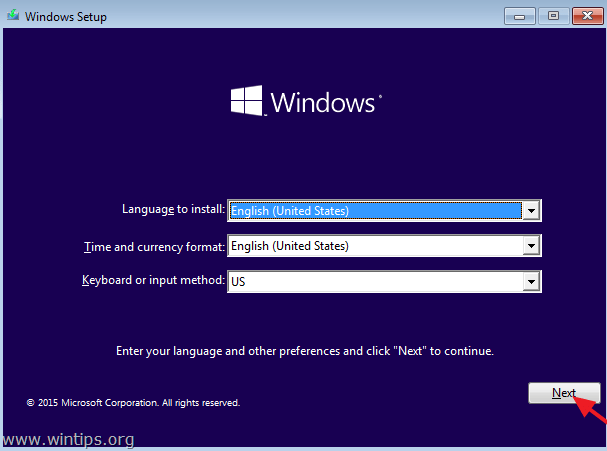
3. Select Repair your computer.
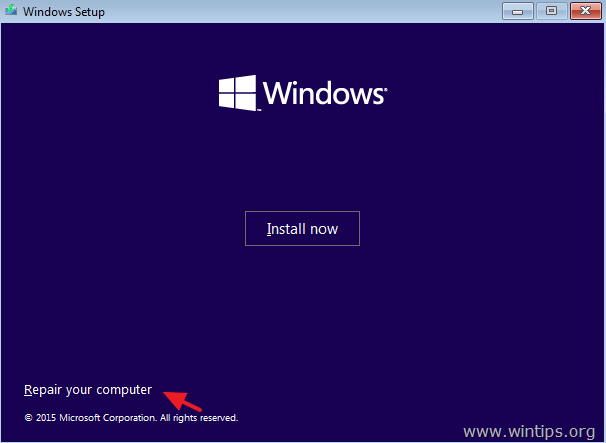
4. Then select Troubleshoot > Advanced Options > Command Prompt.
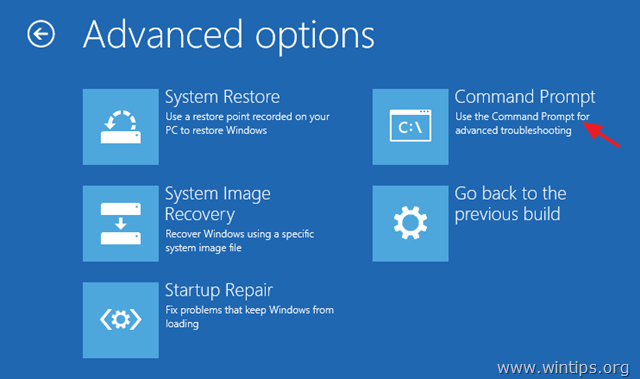
5. Type BCDEDIT and press Enter.

6. Locate in which drive letter Windows are installed. *
* e.g. As you can see in the screenshot below Windows are installed in drive letter D:
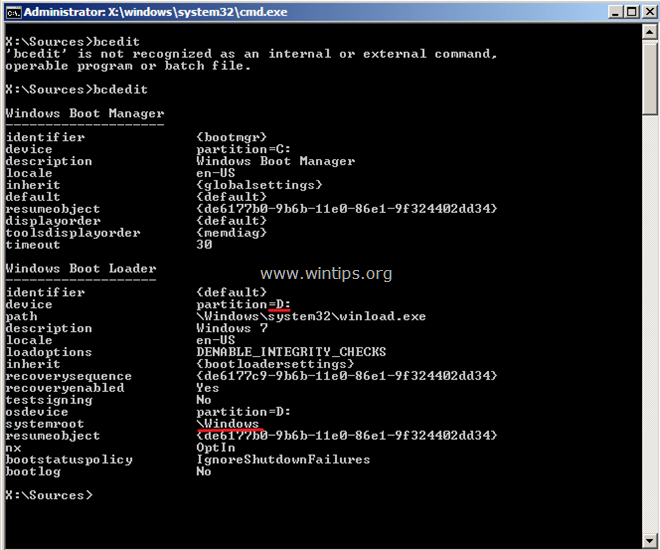
7. At the command prompt window, type the following command to scan and repair system files. *
sfc /scannow /offbootdir=<Windows_Drive_Letter>:\ /offwindir=<Windows_Drive_Letter>:\windows
*Replace the «<Windows_Drive_Letter>» with the drive letter where Windows are installed. **
** e.g. In this example the command should be:
sfc /SCANNOW /OFFBOOTDIR=D:\ /OFFWINDIR=D:\windows

8. Now be patient. The SFC command takes some time to scan and repair the corrupted files. *
* Note: If you receive the «Windows Resource Protection could start the repair service» error message, then make sure that you ‘re using a Windows Installation Media according to the Windows Version and Edition you try to repair. This means that if you want to repair a Windows 10 64Bit installation, then you have to boot your system from a Windows 10 64bit installation media.
7. When the repair is done, close command prompt window and restart your computer.

That’s it! Let me know if this guide has helped you by leaving your comment about your experience. Please like and share this guide to help others.
If this article was useful for you, please consider supporting us by making a donation. Even $1 can a make a huge difference for us in our effort to continue to help others while keeping this site free:
- Author
- Recent Posts
Konstantinos is the founder and administrator of Wintips.org. Since 1995 he works and provides IT support as a computer and network expert to individuals and large companies. He is specialized in solving problems related to Windows or other Microsoft products (Windows Server, Office, Microsoft 365, etc.).

